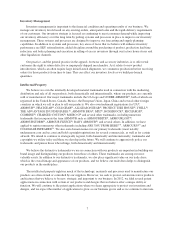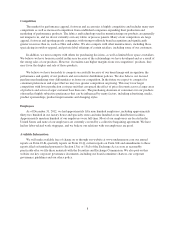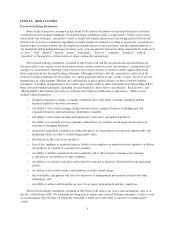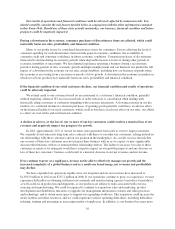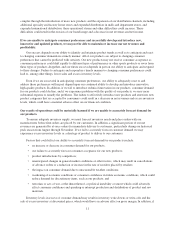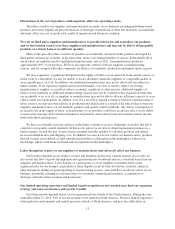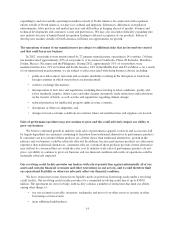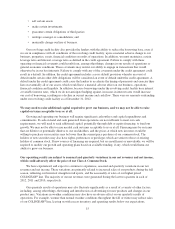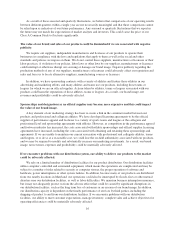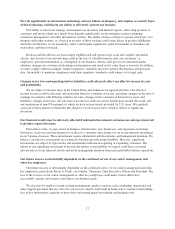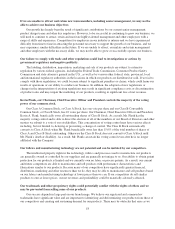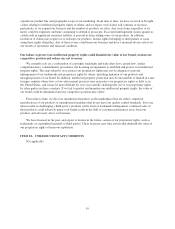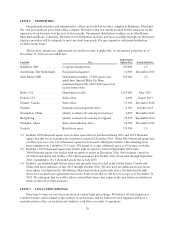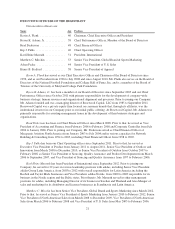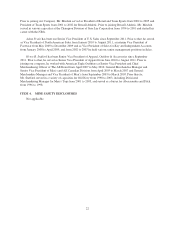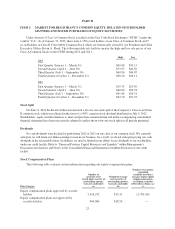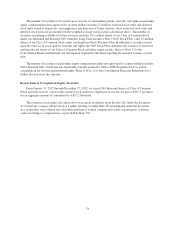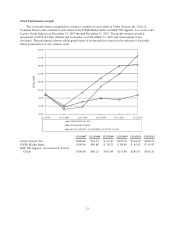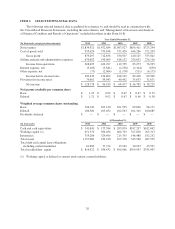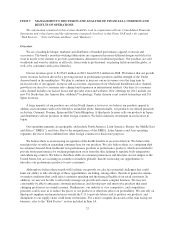Under Armour 2012 Annual Report Download - page 25
Download and view the complete annual report
Please find page 25 of the 2012 Under Armour annual report below. You can navigate through the pages in the report by either clicking on the pages listed below, or by using the keyword search tool below to find specific information within the annual report.We rely significantly on information technology and any failure, inadequacy, interruption or security lapse
of that technology could harm our ability to effectively operate our business.
Our ability to effectively manage and maintain our inventory and internal reports, and to ship products to
customers and invoice them on a timely basis depends significantly on our enterprise resource planning,
warehouse management, and other information systems. The failure of these systems to operate effectively or to
integrate with other systems, or a breach in security of these systems could cause delays in product fulfillment
and reduced efficiency of our operations, and it could require significant capital investments to remediate any
such failure, problem or breach.
Hackers and data thieves are increasingly sophisticated and operate large scale and complex automated
attacks. Any breach of our network may result in the loss of valuable business data, our customers’ or
employees’ personal information or a disruption of our business, which could give rise to unwanted media
attention, damage our customer relationships and reputation and result in lost sales, fines or lawsuits. In addition,
we must comply with increasingly complex regulatory standards enacted to protect this business and personal
data. An inability to maintain compliance with these regulatory standards could subject us to legal risks.
Changes in tax laws and unanticipated tax liabilities could adversely affect our effective income tax rate
and profitability.
We are subject to income taxes in the United States and numerous foreign jurisdictions. Our effective
income tax rate could be adversely affected in the future by a number of factors, including: changes in the mix of
earnings in countries with differing statutory tax rates, changes in the valuation of deferred tax assets and
liabilities, changes in tax laws, the outcome of income tax audits in various jurisdictions around the world, and
any repatriation of non-US earnings for which we have not previously provided for U.S. taxes. We regularly
assess all of these matters to determine the adequacy of our tax provision, which is subject to significant
discretion.
Our financial results may be adversely affected if substantial investments in businesses and operations fail
to produce expected returns.
From time to time, we may invest in business infrastructure, new businesses, and expansion of existing
businesses, such as recent investments in our direct to consumer sales channel or our recent minority investment
in our Japanese licensee. These investments require substantial cash investments and management attention. We
believe cost effective investments are essential to business growth and profitability. However, significant
investments are subject to typical risks and uncertainties inherent in acquiring or expanding a business. The
failure of any significant investment to provide the returns or profitability we expect could have a material
adverse effect on our financial results and divert management attention from more profitable business operations.
Our future success is substantially dependent on the continued service of our senior management and
other key employees.
Our future success is substantially dependent on the continued service of our senior management and other
key employees, particularly Kevin A. Plank, our founder, Chairman, Chief Executive Officer and President. The
loss of the services of our senior management or other key employees could make it more difficult to
successfully operate our business and achieve our business goals.
We also may be unable to retain existing management, product creation, sales, marketing, operational and
other support personnel that are critical to our success, which could result in harm to key customer relationships,
loss of key information, expertise or know-how and unanticipated recruitment and training costs.
17


